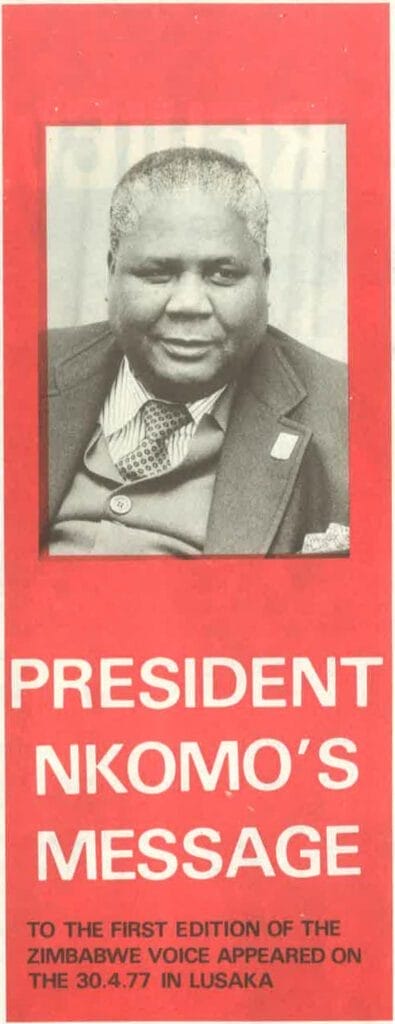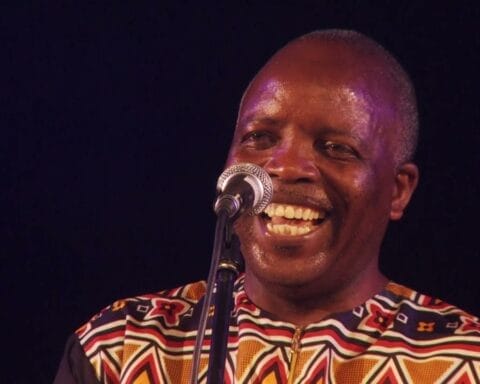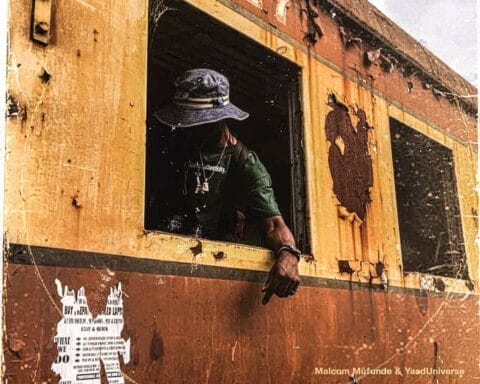This is a digitised excerpt from ‘President Nkomo’s Message’ from The Zimbabwe Review Vol. 6 Quarterly No. 5-6/77.
Dear Comrades and friends; I feel that at the inception of our newsletter, THE ZIMBABWE PEOPLE’S VOICE, I should give you a picture of the situation in our country. The position is that we in Zimbabwe, like all people all over the world, demand the right to determine our own destiny. We seek to be masters of our own future, our own destiny. We have tried for a number of years to achieve this objective. To be precise, the present phase of the liberation started some 30 years ago. I am not belittling or ignoring the historical development and side of our struggle. I am referring to the current phase with its continuity on both methods and objectives.
We have had conferences many times. In 1961 we had a constitutional conference on Rhodesia. Since then there have been attempts to hold conferences and settle the Rhodesian question. Let me put it this way, several attempts failed and in 1965 the Rhodesian regime declared what it called independence. This it did unilaterally. All African leaders were seized, detained and imprisoned, The British Government at the time refused to remove people they termed rebels against the British Queen. We decided to take arms and fight for our motherland. During that period, the British Government came up with one plan after another to try to settle with their kith and kin. Their kith and kin were, however, beyond the pale and would not accept what we regarded as sell-out proposals but what they claimed to be a giving in to what they call irresponsible people. Such were the proposals discussed by the British Government leaders and the Rhodesian racists aboard the Tiger and Fearless in the 1960s. These culminated with those, proposals worked out by Rhodesian racists and the British Conservatives, and announced on November 24, 1971. We rejected them all because they did not meet our just demands.

In 1974, after our brothers of the front-line states had discussed with us the possibilities of a settlement after 10 years of war, we attempted to get a settlement. It was all to no avail. A few months later, we were again approached by our front-line states brothers who have been struggling with us for a number of years to get a settlement of the Rhodesian problem, and who felt that if there was a chance of negotiation and ending the war, it should be taken up. We did. We went to Geneva. But again the conference was a failure. The regime of Rhodesia and the British Government were not interested in what we thought we had gone to discuss in Geneva.
We went to Geneva to work out a machinery for the transfer of power from the minority regime to the majority of the people of Zimbabwe, including those presently wielding power in our country. I would like to make it very clear that by a minority we mean a minority of our people who have held illegitimate power for more than 85 years now. This transfer would have included that minority because we said they are a part of our people, they are a part of the majority. Like in previous cases, the Rhodesian regime and the British Government decided to end up the conference without consulting or informing us.
Now the British Government intends calling another conference. We have made our position very clear on this. We have said after all these years of attempting to come to an agreement with the British Government on our country’s problem, we have come to one conclusion, and that is: THE ONLY WAY TO OBTAIN OR ATTAIN OUR OBJECTIVES IS BY FIGHTING IT OUT AND DEFEATING THE REGIME IN THE BATTLE-FIELD. We have come to this conclusion not because we are lovers of war, but because the British Government, the Rhodesian regime and their supporters have refused to give in to the demands of our people for a rightful place in our own country. Now we have told the British that as far as we are concerned, the Geneva conference is dead and buried, and we shall never go again to another Geneva conference. If the British Government is interested in a conference on Rhodesia, then it must be a new conference right from scratch, and certain things have got to be accepted right from the beginning.
The first is that the Geneva conference is dead, and the second is that the Rhodesian situation is a war situation. Having accepted that the Rhodesian situation is a war situation and not an ordinary one, we have told the British Foreign Relations Secretary, Dr. David Owen, that those to take part in any conference must be those involved in the war. We have made this perfectly clear to Dr. Owen. On our side it is the Patriotic Front, and on the British Government’s side it is the British Government with the Rhodesian regime as an extension of the British Government. Without mentioning names, we are only saying: ONLY THOS; ENGAGED IN THE WAR RAGING IN RHODESIA TODAY MUST REMOVE THE CAUSES OF THAT WAR IF A SETTLEMENT MUST BE REACHED. It should be remembered that the conference idea and preparations came because of the war being fought by the Patriotic Front on one side, and British colonial forces of the Rhodesian regime on the other. Only these parties must participate in a conference.
Then we have said to the British Government that the next requirement is a clearly defined agenda. That agenda must have only one item and it should be the transfer of power from the minority, to the majority. This means a constitution based on universal adult suffrage. This item should take from about four to five days. The rest of the time can be spent on drafting the constitution after its content has been cleared within the four to five days.
The British Government has ·said it would like to co-sponsor the conference with the United States Government. At one time we were made to understand that the US Government should cochair the conference. We have made our position clear on this, and it is that Southern Rhodesia is a colony of Britain. Decolonisation of that colony is between us and the British Government. The combatants in the war in Rhodesia are ourselves and the British, and, therefore, no other power should take part in any conference between us and our colonisers. That is not to say the Americans should not assist if they can. They can do it like any other country outside the conference. They did it in Geneva. If the British Government insists on introducing the United States into the conference, then the British Government should accept if other powers demand to be in the conference too. We do not want to spend months on end trying to decide who should attend the conference when there is a conflict of and between nations demanding to attend the conference.
I must stress here that the fighting in Zimbabwe has brought about this conference idea. The Patriotic Font whose forces are inflicting heavy blows upon the Rhodesian regime, has an obvious right to decide who shouId attend and what should be discussed. The British Government cannot have it both ways. It refused to intervene militarily on several occasions when we called on it to step to avert a serious situation from developing in Rhodesia. Even after UDI, the British Government flatly refused to intervene. We are now fighting and the British Government says it is convening a conference to be attended by parties chosen by itself, to discuss items chosen by itself. We cannot accept this.
Lastly, we have made it clear that any document that comes out of that conference, that is any agreement made by the conference must be capable of implementation. It shall have to be implemented. We shall not go to a conference the implementation of whose decisions shall be dependent on Ian Smith, as Dr. Owen has said. Our stand is that an agreement of the conference must be carable of implementation without any regard to Smith’s views or wishes. That is important.








